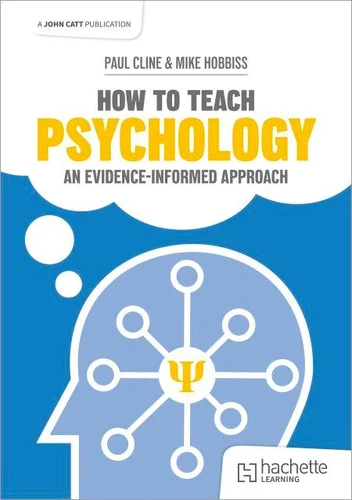How to Teach Psychology: An evidence-informed approach
Par : ,Formats :
Disponible dans votre compte client Decitre ou Furet du Nord dès validation de votre commande. Le format ePub protégé est :
- Compatible avec une lecture sur My Vivlio (smartphone, tablette, ordinateur)
- Compatible avec une lecture sur liseuses Vivlio
- Pour les liseuses autres que Vivlio, vous devez utiliser le logiciel Adobe Digital Edition. Non compatible avec la lecture sur les liseuses Kindle, Remarkable et Sony
- Non compatible avec un achat hors France métropolitaine
 , qui est-ce ?
, qui est-ce ?Notre partenaire de plateforme de lecture numérique où vous retrouverez l'ensemble de vos ebooks gratuitement
Pour en savoir plus sur nos ebooks, consultez notre aide en ligne ici
- Nombre de pages468
- FormatePub
- ISBN978-1-0360-0173-5
- EAN9781036001735
- Date de parution23/05/2025
- Protection num.Adobe DRM
- Infos supplémentairesepub
- ÉditeurJohn Catt
Résumé
Psychology as a subject is more popular in secondary schools than ever before, but achieving deep insights into, and appreciation of, the complexity of human behaviour is a challenge that requires expert guidance and teaching. In addition to teaching the often demanding subject content on their specifications, Psychology teachers must also be experts in inculcating mathematical skills and written communication.
All this in students who often start without any prior experience of the subject. This poses serious challenges for teachers' subject knowledge, pedagogy and planning. And yet, until now, little has been written about how to teach Psychology effectively. This book aims to help anyone facing that challenge. Drawing on a wealth of psychological and pedagogical insights, coupled with years of teaching experience, Paul Cline and Mike Hobbiss provide practical advice and concrete suggestions to support Psychology teachers at all levels.
From curriculum choices to the minutiae of in-class decisions, from developing as an individual teacher to leading a Psychology department, this book provides the complete, evidence-informed guide to teaching Psychology.
All this in students who often start without any prior experience of the subject. This poses serious challenges for teachers' subject knowledge, pedagogy and planning. And yet, until now, little has been written about how to teach Psychology effectively. This book aims to help anyone facing that challenge. Drawing on a wealth of psychological and pedagogical insights, coupled with years of teaching experience, Paul Cline and Mike Hobbiss provide practical advice and concrete suggestions to support Psychology teachers at all levels.
From curriculum choices to the minutiae of in-class decisions, from developing as an individual teacher to leading a Psychology department, this book provides the complete, evidence-informed guide to teaching Psychology.
Psychology as a subject is more popular in secondary schools than ever before, but achieving deep insights into, and appreciation of, the complexity of human behaviour is a challenge that requires expert guidance and teaching. In addition to teaching the often demanding subject content on their specifications, Psychology teachers must also be experts in inculcating mathematical skills and written communication.
All this in students who often start without any prior experience of the subject. This poses serious challenges for teachers' subject knowledge, pedagogy and planning. And yet, until now, little has been written about how to teach Psychology effectively. This book aims to help anyone facing that challenge. Drawing on a wealth of psychological and pedagogical insights, coupled with years of teaching experience, Paul Cline and Mike Hobbiss provide practical advice and concrete suggestions to support Psychology teachers at all levels.
From curriculum choices to the minutiae of in-class decisions, from developing as an individual teacher to leading a Psychology department, this book provides the complete, evidence-informed guide to teaching Psychology.
All this in students who often start without any prior experience of the subject. This poses serious challenges for teachers' subject knowledge, pedagogy and planning. And yet, until now, little has been written about how to teach Psychology effectively. This book aims to help anyone facing that challenge. Drawing on a wealth of psychological and pedagogical insights, coupled with years of teaching experience, Paul Cline and Mike Hobbiss provide practical advice and concrete suggestions to support Psychology teachers at all levels.
From curriculum choices to the minutiae of in-class decisions, from developing as an individual teacher to leading a Psychology department, this book provides the complete, evidence-informed guide to teaching Psychology.



